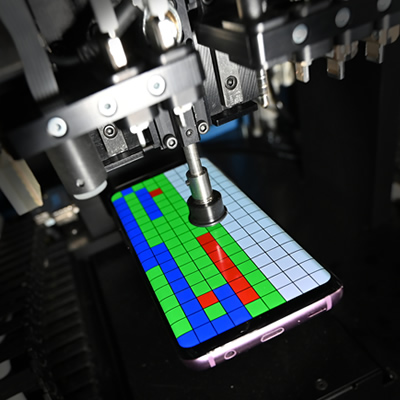The FutureDial Blog
(2.12.2024)
Observations from the Field: How Mobile Device Refurbishing Businesses are Getting Things Right in their Operations
 TAKEAWAY: In the reverse logistics sector of the mobile supply chain, successful mobile phone refurbishing businesses have distinguished themselves by optimizing operations through automation and data-driven approaches. Utilizing data to assign testing profiles to specific phone models has reduced inefficiencies associated with over-testing. Automation has revolutionized the industry, enhancing accuracy and consistency in device quality for resale in secondary markets. The scalability and predictability of automation provide significant advantages, allowing businesses to adapt seamlessly to seasonal volume fluctuations. Intelligent routing and decision-making, driven by data and automation, have eliminated manual sorting and streamlined processing and handling decisions. This article explores these transformative strategies shaping the mobile phone refurbishment landscape in the reverse logistics mobile supply chain.
TAKEAWAY: In the reverse logistics sector of the mobile supply chain, successful mobile phone refurbishing businesses have distinguished themselves by optimizing operations through automation and data-driven approaches. Utilizing data to assign testing profiles to specific phone models has reduced inefficiencies associated with over-testing. Automation has revolutionized the industry, enhancing accuracy and consistency in device quality for resale in secondary markets. The scalability and predictability of automation provide significant advantages, allowing businesses to adapt seamlessly to seasonal volume fluctuations. Intelligent routing and decision-making, driven by data and automation, have eliminated manual sorting and streamlined processing and handling decisions. This article explores these transformative strategies shaping the mobile phone refurbishment landscape in the reverse logistics mobile supply chain.
A Journey through Data-Driven Excellence and Automation Efficiency
The preowned mobile phone refurbishment industry is experiencing a transformative wave, with businesses embracing data-driven intelligence and automation to optimize their processing operations and workflows. By leveraging these technologies, preowned mobile phone refurbishing businesses are streamlining their processes, reducing waste, and achieving consistent quality in their devices.
In this article, we explore some instances which we have seen in the industry, where these refurbishing businesses have implemented data-driven strategies and automation to “get things right” in their operations, leading to improved efficiency and success.
Data-Driven Testing Profiles for Incoming Mobile Devices: Precision in Every Test
One of the significant challenges in mobile phone refurbishment is how to efficiently and accurately test incoming preowned devices to ensure their functionality without wasting valuable resources. Traditionally, businesses employed a manual, one-size-fits-all testing approach, leading to over-testing and decreased productivity. Forward-thinking refurbishing businesses now leverage data-driven testing profiles, utilizing historical data and machine learning algorithms to create tailored testing protocols for each phone model. This approach eliminates over-testing, saving time, manpower, and resources, while maintaining a high standard of quality control.
Data Collection and Analysis: At the core of data-driven testing profiles is the collection and analysis of vast amounts of historical data. Refurbishing businesses compile comprehensive databases that record the test results and performance metrics of various mobile phone models over time. These datasets encompass data from functional testing, hardware diagnostics, software evaluations, and other crucial performance indicators.
Machine Learning Algorithms: With the collected data in hand, refurbishing businesses employ sophisticated machine learning algorithms to analyze and interpret the information. These algorithms can identify patterns, trends, and correlations among different phone models and their corresponding test outcomes. As the dataset grows and new devices are tested, the algorithms continuously learn and refine their models, becoming increasingly accurate and effective.
 Tailored Testing Protocols: Based on the insights derived from data analysis, refurbishing businesses can create unique and tailored testing profiles for each mobile phone model. These profiles define the specific tests and assessments that a particular device needs to undergo to ensure its functionality and quality. By customizing the testing protocols to the individual characteristics of each phone model, refurbishers can avoid the inefficiencies of over-testing while still maintaining a high standard of quality control.
Tailored Testing Protocols: Based on the insights derived from data analysis, refurbishing businesses can create unique and tailored testing profiles for each mobile phone model. These profiles define the specific tests and assessments that a particular device needs to undergo to ensure its functionality and quality. By customizing the testing protocols to the individual characteristics of each phone model, refurbishers can avoid the inefficiencies of over-testing while still maintaining a high standard of quality control.
Avoiding Over-Testing and Resource Waste: One of the primary advantages of data-driven testing profiles is the elimination of over-testing. Traditionally, refurbishing businesses would subject every device to a fixed battery of tests, regardless of the model’s specific features or potential issues. With data-driven testing, devices are only subjected to the tests that are relevant and necessary for their particular configurations. This leads to significant resource savings in terms of time, labor, and equipment usage.
Increased Efficiency and Scalability: By implementing data-driven testing profiles, refurbishing businesses achieve a higher level of operational efficiency. The streamlined testing process allows for quicker turnaround times, ensuring that devices move through the refurbishment pipeline more rapidly. Additionally, the reduction in unnecessary testing means that human resources can be reallocated to other crucial tasks, further optimizing overall productivity.
Enhanced Customer Satisfaction: Ultimately, data-driven testing profiles result in refurbished mobile phones of superior quality. As a consequence, customers receive devices that have undergone precise and tailored testing, leading to increased customer satisfaction and confidence in the product. Higher customer satisfaction translates into improved brand reputation and potentially increased customer loyalty and repeat business.
In these ways discussed above, data-driven testing profiles are revolutionizing the mobile phone refurbishment industry by leveraging historical data and machine learning algorithms to create tailored testing protocols for each device model. This intelligent approach reduces resource waste, increases overall efficiency, and boosts customer satisfaction. As refurbishing businesses continue to embrace data-driven solutions, they position themselves at the forefront of the industry, ready to adapt to new challenges and advancements in the ever-evolving world of mobile technology.
Integrating Automation for Improved Accuracy, Consistency and Scalability:
As the mobile phone refurbishment industry continues to evolve, refurbishing businesses are recognizing the immense potential of automation in transforming their processing operations. By deploying automation systems, such as software, robotic devices and “if-then” decision automation technology, refurbishers can achieve higher levels of accuracy, consistency, and scalability, leading to a multitude of benefits for their business and customers.
 Precise and Repeatable Tasks: Automation systems, especially robotic devices, excel at performing precise and repeatable tasks. In the context of mobile phone refurbishment, this means that robots can execute specific processes with consistent accuracy, reducing the likelihood of human errors that might occur during manual operations. For instance, robots can conduct intricate hardware tests, apply screen protectors, or execute software installations with exceptional precision. The elimination of variability in processing tasks contributes to a higher standard of quality for refurbished phones, ensuring that each device leaving the processing center meets strict quality control standards.
Precise and Repeatable Tasks: Automation systems, especially robotic devices, excel at performing precise and repeatable tasks. In the context of mobile phone refurbishment, this means that robots can execute specific processes with consistent accuracy, reducing the likelihood of human errors that might occur during manual operations. For instance, robots can conduct intricate hardware tests, apply screen protectors, or execute software installations with exceptional precision. The elimination of variability in processing tasks contributes to a higher standard of quality for refurbished phones, ensuring that each device leaving the processing center meets strict quality control standards.
Enhanced Quality and Customer Satisfaction: By leveraging automation for tasks that demand precision and attention to detail, refurbishing businesses can significantly enhance the quality of their refurbished devices. Customers receive products that have undergone standardized and reliable processes, instilling confidence in the reliability and performance of preowned devices. Improved quality directly translates to higher customer satisfaction, bolstering the reputation of refurbishing businesses and driving customer loyalty.
Predictable and Scalable Operations: Automation is a key enabler of scalable operations in the mobile phone refurbishment industry. Traditional manual processing workflows often struggle to cope with fluctuating demand, leading to inefficiencies, delays, and potential bottlenecks. In contrast, automation provides refurbishing businesses with the flexibility to scale their operations seamlessly.
During periods of increased demand, such as seasonal spikes or the release of new smartphone models, refurbishers can deploy robots on overtime shifts without the need for extensive human training or supervision. This adaptability allows businesses to meet heightened demand while maintaining consistent processing speeds and turnaround times.
Reducing Dependence on Manual Labor: Incorporating automation in refurbishment processes also reduces reliance on manual labor for repetitive and labor-intensive tasks. By offloading these tasks to robotic devices, refurbishing businesses can reallocate their human workforce to more value-added activities, such as complex repairs, quality assurance, or customer service. This not only optimizes resource utilization but also enhances the skillset and job satisfaction of employees, leading to a more motivated and engaged workforce.
Staying Competitive in the Market: In a dynamic and rapidly evolving mobile phone refurbishment market, businesses must stay agile and responsive to changing consumer demands. Automation offers refurbishers a competitive edge by enabling them to achieve higher efficiency, cost-effectiveness, and quality compared to their non-automated counterparts. The ability to consistently deliver high-quality refurbished phones and rapidly scale operations positions businesses as leaders in the industry, capable of meeting market demands and outperforming competitors.
Integrating automation into mobile phone refurbishment processes brings a plethora of benefits to refurbishing businesses. Enhanced accuracy, consistent quality, and scalability result in improved customer satisfaction, reduced resource waste, and increased operational efficiency. As automation technology continues to advance, refurbishing businesses that embrace automation are well-positioned to thrive in the competitive market, providing customers with reliable, high-quality preowned devices and paving the way for a successful and sustainable future.
Intelligent Routing of Mobile Phones for Processing:
The efficient movement of mobile phones through the refurbishment process is crucial for minimizing turnaround times and maximizing productivity. Traditionally, this task involved manual sorting and routing, time-consuming tasks which were prone to human errors and could lead to delays and misplacements. However, the integration of data analysis and automation has transformed this aspect of refurbishment operations, enabling businesses to implement intelligent decision-making and routing systems. Such automated systems not only save time but also reduce errors, ensuring devices follow an optimized path through processing stations, and enable businesses to be more efficient and adaptive to volume fluctuations.
Data-Driven Algorithms: At the heart of intelligent routing is the utilization of data-driven algorithms. Refurbishing businesses accumulate vast amounts of data related to the various mobile phone models they handle. This data includes device specifications, historical processing times, and other relevant metrics. By analyzing this data, businesses can gain insights into the most efficient routes for different phone models, ensuring that devices move through the processing stations with optimal speed and accuracy.
Tailored Routing Plans: Based on the analysis of historical data and device characteristics, data-driven algorithms generate tailored routing plans for each mobile phone model. These routing plans take into account the specific processing requirements and potential bottlenecks for individual devices. As a result, each phone is assigned a customized path through the refurbishment process, reducing unnecessary backtracking and minimizing idle time.
Automation Technologies: Intelligent routing is seamlessly integrated with automation technologies, such as robotic arms or conveyor systems. These automated components serve as the physical means for executing the data-driven routing plans. As a mobile phone moves through the refurbishment process, the automation system guides it along the designated route, ensuring a smooth and efficient workflow.
Time Savings: By automating the routing process, refurbishing businesses save significant amounts of time. Manual sorting and routing can be a labor-intensive and time-consuming task, especially as the volume of incoming devices increases. Automation streamlines this process, allowing for faster movement of mobile phones between processing stations. This time-saving benefit contributes to shorter turnaround times, enabling businesses to process more devices within the same time frame.
Error Reduction: Intelligent routing minimizes the risk of human errors and misplacements that can occur during manual sorting. The automated system follows the precise routing plan generated by data-driven algorithms, eliminating the potential for human errors in directing devices to the wrong stations. This reduction in errors enhances the overall efficiency of refurbishment operations and ensures a higher level of accuracy in processing.
Adaptability to Volume Fluctuations: During periods of varying demand, such as seasonal peaks or new product releases, the workload in refurbishment centers can fluctuate significantly. The intelligent routing system, backed by data analysis, can adapt to these volume changes. The algorithms can reevaluate and optimize the routing plans based on real-time data, enabling businesses to efficiently handle increased or decreased device volumes without disruptions or delays.
Getting It Right: Refurbishers are Streamlining with Data and Automation
 As the mobile phone refurbishment industry evolves, businesses are increasingly embracing data-driven intelligence and automation to enhance their processing operations and workflows. By leveraging testing profiles, integrating automation for improved accuracy and scalability, and implementing intelligent routing systems, refurbishing businesses are “getting things right” and achieving greater efficiency and success. These strategies enable them to optimize resource utilization, provide consistent quality devices, and respond effectively to changing market demands. As the industry continues to advance, it is evident that data and automation will remain crucial factors in propelling mobile phone refurbishment to new heights.
As the mobile phone refurbishment industry evolves, businesses are increasingly embracing data-driven intelligence and automation to enhance their processing operations and workflows. By leveraging testing profiles, integrating automation for improved accuracy and scalability, and implementing intelligent routing systems, refurbishing businesses are “getting things right” and achieving greater efficiency and success. These strategies enable them to optimize resource utilization, provide consistent quality devices, and respond effectively to changing market demands. As the industry continues to advance, it is evident that data and automation will remain crucial factors in propelling mobile phone refurbishment to new heights.
Your Key to Profitable Reverse Logistics in the Mobile Device Chain
Leading mobile device refurbishing enterprises collaborate with FutureDial to integrate processing automation solutions into their operations. FutureDial’s advanced software and robotics not only streamline the processing of preowned mobile devices but also significantly boost the overall profitability of these businesses. Whether you’re a mobile phone recycler, wireless carrier, wholesaler, refurbisher, 3PL, trade-in or buyback provider, MNO, MVNO, reseller, or a direct-to-consumer mobile device reseller, FutureDial is poised to be your strategic partner for automation and success in this fiercely competitive market. To unleash the full potential of our innovative solutions for your business, reach out to us today at sales@futuredial.com .
© 2024 FutureDial Incorporated. All Rights Reserved.

